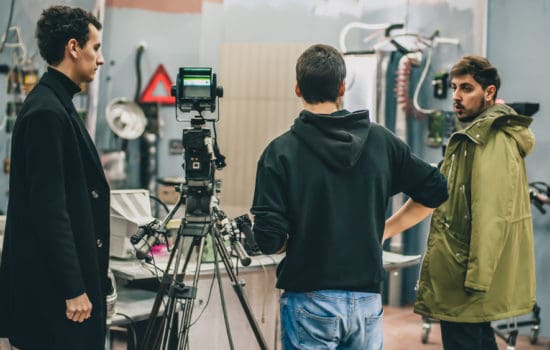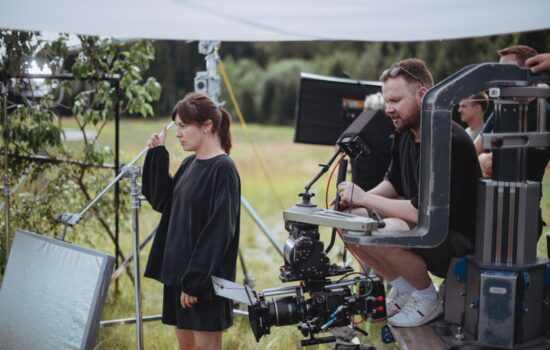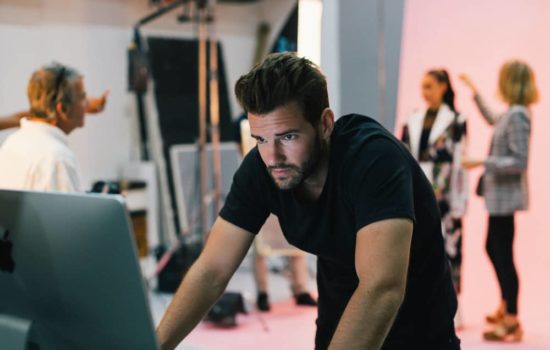Executive Producer (Film)
Career Overview
The Executive Producer provides the financial backing for a film project. Their involvement depends on the project with some EPs only securing funds and others getting involved in the filmmaking process.
Alternate Titles
EP, Film Financier
Salary Range
Dependent on project budget and level of success

How To Become an Executive Producer (Film)
People also ask
Career Description
The Executive Producer of a film handles the finances of a project.
They bring in investors such as a studio or independent finance company, or they may invest their own capital. It is their responsibility to ensure that the production has the funding it needs throughout the lifespan of the project. They also serve as the liaison between the film’s financiers and the project’s Producers.
In addition to the funding they secure for a project, Executive Producers may also serve in a creative or supervisory role.
In this capacity, they’ll find intellectual property (IP) and package the production by finding the right talent and format for the project. They’ll then take the project to studios and see if they can attract a buyer.
Executive Producers can also play an important role in selecting the project’s top talent, including well-known Actors and Directors, and in hiring Producers, Choreographers, and Accountants / Assistant Accountants for the project.
Regardless of whether they involve themselves in the creative needs of a film, EPs make sure that their project sticks to its budget and delivers on its creative promise.
To learn more about what it’s like to work as an Executive Producer, we spoke to:
- Grady Craig (Gasoline Alley, Slayers, White Elephant)
- Angela Mancuso (Happy Death Day, Happy Death Day 2U, Who Fears Death)
What do Executive Producers do?
There are a number of different types of Producers. There are Associate Producers, Co-producers, Lead Producers, Line Producers, Creative Producers, and Executive Producers [EPs]. They all have unique classifications based around their contributions or responsibilities on a project.
Most of the time, the standalone title “Producer,” is reserved for the single person (or two) who lead(s) most of the production. They fundraise, run the financial closing, support casting, oversee the budget and schedule, they’re on the ground, and they’re the main point of contact for any production. Projects typically reserve one or two Producer credits to uphold the value of their contributions. Any of the other sub-producers–Associate Producers, Executive Producers–these are effectively limitless, but the more shared credits you add to any project, the more you dilute their perceived value.
Earning the Executive Producer credit usually comes down to making a “major” contribution to the project’s completion, either through investment, service, or some level of relationship access you can provide (Actors, Directors, distributors, financiers, etc.).
Sometimes individuals are credited for more than one role in the production. Acting and producing, directing and producing, writing and directing, etc. These are situations where individuals are compensated for multiple levels of responsibility.
There are all kinds of Executive Producers. What I do is develop ideas. Sometimes they’re from books, sometimes from news articles, sometimes they’re original ideas. Sometimes I find them myself and sometimes they come to me from Writers. I try to develop them in what seems to be the appropriate format, which can be a feature film, a television movie, a series, or a limited series, depending on what the material lends itself to be. Then, I get it into creative shape and bring it to a network and pitch and sell.
What are the responsibilities of an Executive Producer?
I do a lot of reading. I read newspaper articles. I read a lot of books. It runs the gamut. I read specs people bring to me. When I’m in development or not in production, I’m doing a lot of reading or researching. And that can be anything: it can be looking at Amazon new releases, the book reviews in The New York Times or some magazine, or an article on the radio that I hear. Any story that sounds interesting to me. I spend a lot of time looking for stories.
That’s the easy part: finding a story or idea that you like and that’s compelling. The hard part is finding out if there’s a market for it and a place to sell it, and finding a Writer who wants to adapt it for you. That’s the part of my job that happens when I’m not in production.
Once I sell something, my job completely changes. It becomes about who the buyer is, what they want, what changes they want, and then getting it to production where it becomes a completely different issue of finding a Director and cast. Sitting on a set and scouting for locations and actually making something…that’s the fun part.
The hard part of it is things shift under your feet. You never know what you’re going to sell and what you’re not going to sell. We work for money and to make a living. There’s the stress of developing, developing, developing, and then not getting something made, and that happens often. You can work on something for years and never get it made.
Executive Producers can be freelance or they have a slate of their own projects that they’re trying to package, shop, and get off the ground. I think the key to being a successful Executive Producer is having a range of projects on your slate at different stages. Maybe they’ve been working on one for years and developed it creatively; taken it out to talent or Agents and Managers to get attachment and interest that way, but they also have a number of other projects that they’re personally invested in that have the chance to go. Having a pipeline of projects amplifies your ability to make one after the other.
I think the role of an EP is to guide filmmakers, Lead Producers, Screenwriters, and Directors. An EP should provide a level of value that progresses the film or series closer to becoming a reality.
Salary
What an Executive Producer makes on a project depends on multiple factors, including the scope of the production and its overall success.
A low-budget indie film will translate into a lower salary for an Executive Producer than working on a studio-backed blockbuster. For Executive Producers who receive a flat upfront fee for their services, this may be where their compensation for a project ends.
EP Betsy Beers breaks down what it means to executive produce for both film and television.
That being said, EPs often strike deals that provide a percentage of what a project makes, allowing them to make more on a film that performs well in theaters and through other forms of distribution like video on demand.
Pending international sales, syndication, and other deals that provide revenue for a production, an Executive Producer can generally earn a sizable salary in comparison to other individuals associated with the film.
With the many differing pay structures and possible success outcomes, it’s hugely difficult to determine an annual salary range for an Executive Producer, especially given that many of them work on a project for several years at a time.
How does an Executive Producer make money from a project?
Usually, there’s an Executive Producer fee built into the budget or backend profits. The percentage determined for either is negotiated with the Lead Producer, within reason, for what you’ve provided for the progress of the film or series.
Generally, investors in film are offered 120% of their financial commitment. The return can end up being more or less than this based on how the film performs in the box office.
Unless something gets into production, you don’t make money or you make minimal money (if someone wants to pay you a very small development fee). When something gets into production, depending on what the genre is and who you’re selling it to, it can be a lot of money or it can be just an okay amount of money. It really depends on the project and what medium it gets released through.
But you don’t get any money unless you get something made. That’s the stressful part.
Do Executive Producers get paid?
Unless an Executive Producer is hired onto a studio or production company-backed project, they may not receive any upfront pay for their services and go without payment until the distribution phase when the film is released for audiences.
Many Executive Producers are the first to come on board a project, and while it is normally their job to find the financing for a film, they will often hold off on paying themselves so that those funds can go entirely to the production instead.
Who gets paid more, the Producer or Executive Producer?
In most scenarios, the Executive Producer will earn more on a project because of their significant responsibilities and ability to negotiate payment structures in addition to an upfront fee for their work. Depending on the scope of the Producer’s work, they will typically earn less than the Executive Producer.
Hey, what do you think about trying our new Film Career HelperFilm Career Helper really quick? It’s totally free and could help get your career moving fast! Give it a try. It’s totally free and you have nothing to lose.
Career Outlook
Being the person responsible for a project’s funding can feel like an overwhelming undertaking. If you love wearing that hat, though, you can find fulfillment and longevity as an Executive Producer.
No role in entertainment comes with guaranteed success–and that of an EP is no exception. It can be hugely challenging to find those with the financial resources to back your project. And that’s only the first step. Then you need to convince them that your production is one they should support with those resources.
That’s why becoming an Executive Producer goes hand in hand with having an absolute passion for the work. Because if you can’t convince yourself that you love it, you won’t convince anyone else either.
In looking over rankings of the most successful EPs1 to date, you’ll notice that a fair amount of those on the list are known primarily as other types of creatives. Take for instance Steven Spielberg who we generally think of as a Director or Stan Lee who made his name as the founder of Marvel Comics.
This video provides a professional overview of prolific EP Kathleen Kennedy and insights on her career.
But then you have individuals like Kathleen Kennedy and Louis D’Esposito who have mainly made their careers as Executive Producers. Not coincidentally, each has strong working relationships with Spielberg and Marvel, respectively, which have undoubtedly impacted their success.
You don’t have to be the person behind the biggest blockbusters or movie franchises to be a successful Executive Producer, though. However, what these examples do show is how those driven to be EPs can reap incredible professional acclaim for their hard work.
Make no mistake; it’s hard work to be an Executive Producer. But if you go into this profession with that knowledge and are determined nonetheless to bring to the screen the stories that you think audiences must see, you’ll do well in this role.
What’s higher than an Executive Producer?
The Executive Producer is often considered the highest-ranking title on a production, and that typically is the case. That being said, even an Executive Producer may have to report to or take feedback from the production company or studio executives who brought them on board for the project.
What is the difference between a Producer and an Executive Producer?
An Executive Producer is generally thought of as the person who oversees the finances for a film and has the most senior position on a production. A Producer on a movie is generally more involved with the day-to-day activities of filmmaking, such as working on the script with the Screenwriter, hiring other crew and principal cast, and making sure that the movie’s progress is proceeding as needed.
Career Path
The role of Executive Producer is one of the most powerful on a production, but as such, it often takes years of hard work to land this job title.
Though her talent and strong work ethic were discovered early into her career, even Kathleen Kennedy started as an Assistant to John Milius and Associate to Spielberg on her earliest films.
Meaning, the career path of an Executive Producer usually entails working one’s way up from entry-level positions like an Intern or Production Assistant to more intermediate roles like an Associate Producer to finally transitioning into the role of EP.
Because an Executive Producer has such significant responsibilities on a project, it takes time for them to gain the skills and know-how that will inspire confidence in others and allow them to be given that role.
What should the Executive Producer focus on more – story or money? This video breaks down the order of priorities.
While some EPs can be involved in the more creative aspects of a production, given that their primary role is to secure financial backing and use it accordingly, many aspiring Executive Producers start off their careers with business school.
If they want to work primarily in the world of film or television, some EPs might also choose to attend film school to understand better all the many elements that go into realizing a project from script to screen.
No matter the springboard to their career as an EP, those wanting to be part of the entertainment industry in this capacity should prepare for several years of “learning the ropes” and handling less important responsibilities as they gain more film business savvy, confidence, and other necessary skillsets.
How do you become an Executive Producer?
There are a couple of ways. My path was a little bit different in that I started at a small media finance company, but small companies actually open up a lot of doors. You have a lot of responsibility working at a small company, and if the people you work with are equally dedicated to putting the time into creating success, you’ll find yourself earning the credits you deserve.
For other people, I think it’s just about knowing people. If you know Agents and you know Managers who have rosters of name-talent, being able to have a cordial friendship and go to them and say, “Hey, I think Malin Åkerman or Matt Damon would be great for this. What would they cost for X-number of days, and would they be interested in doing something like this?” Those are avenues to becoming an Executive Producer. Again, it’s who you know and how you can provide value to a project that you care about.
An Executive Producer isn’t really the first title for anybody. There isn’t a standard path. Everybody finds their own way. For me, I always wanted to write and be creative. When I went to school, I didn’t go to film school. I decided I was going to go to law school.
When I decided I didn’t want to go to law school anymore, and my parents said, “Go get a job so you can support yourself,” I got a temporary job (at the time) as a Secretary at HBO. HBO was a baby company with forty employees on one floor in New York City.
I was just lucky enough that I was there at a time where everybody was learning. They were sort of the rejects from network television and they were learning what cable was and how it worked, what basic cable was, and what paid cable was. Anybody who raised their hand and said, “I’ll try that job,” basically got to try their hand at whatever it was that had to get done. I ended up in production. I started really learning physical production; how to specifically bring a project to fruition.
I rose through the executive ranks and stayed with HBO for a long time—almost a decade—and then I ended up at Universal for about a decade and a half. I got drafted to Universal and moved out to LA. By the time I left there, I was the President of the Cable Production Group. I did the executive thing for many, many decades before I decided to jump ship and just start producing.
When I started producing, I already had all the knowledge about production and all the knowledge about development, budgets, and distribution. What I had never done was sell. I had to learn how to sell because I was a seller and not a buyer. That was tough. Just like when you go to the store and you have a Salesperson that’s really good at their job: you buy or you don’t buy.
Learning how to present something and make it irresistible or to convince somebody to buy something was hard. It was a lot of work. And it’s still hard. Every buyer is different. Every company is different and every human being working at that company has different tastes. It’s not easy to sell.
You have to not be afraid of the “no’s” because you’re going to get them. You get many more “no’s” than you get “yeses,” and you just get used to it.
Why do Actors become Executive Producers?
Actors may become Executive Producers on a project if they are contributing to the finances for it. They themselves may front funding for the film or bring in investors for the production on account of their connections, which allows them to earn an Executive Producer credit.
Experience & Skills
It’s understandable that aspiring EPs might be eager to be the person to get a film greenlit and perhaps even have a hand in how it is ultimately realized on screen.
But as mentioned, it takes time for most individuals to become Executive Producers.
Whether a film costs $2,000, $200,000, or $2 million to make, that EP has a considerable sum of money that they are responsible for. Those who invest in a project want to know that their funds are being used wisely–and just as importantly, that they will see a return on their investment.
Bottomline: Executive Producers must prove themselves to be that responsible person who can make good on their promise to those backing a project that it can and will be a success.
Paula Wagner, another hugely successful Executive Producer, discusses the process of creating a film.
Of course, not all projects will be hugely profitable. But it’s on the shoulders of an EP to spend wisely every dollar invested in a project to give it the best chance of being successful.
Again, that is why many Executive Producers start off in the business world. That might mean actual business school, working in the professional business sector for a while, or both. An understanding of investment, ROI (return on investment), and all the many other money-minded elements that are involved with a production are critical knowledge for an emerging EP.
Just as important is knowing how to communicate with a host of individuals in both the business and entertainment worlds.
Executive Producers are the vital go-between for investors, studios, production companies, production creatives, and more. They will be the person others will look to for answers on how project dollars are being spent–especially if a production is running behind schedule or going over budget.
As a result, EPs must be comfortable being in constant communication with other high-level individuals on a project, as well as having sometimes difficult conversations about money matters.
Lastly, Executive Producers must know how the world of film and/or television works. Who should get paid what. Where to cut expenses. How a project might translate on a global stage.
All of this is to say that working one’s way up from lower-level roles like Intern or Production Assistant is hardly a waste of time. In fact, it’s an important investment in one’s own career as they move towards becoming an Executive Producer.
What is the difference between an Executive Producer and a Co-Executive Producer?
Given that filmmaking can be an incredibly expensive undertaking even for a modest project, often multiple people are brought on board with the role of Executive Producer to help bring in financing for the production.
Essentially, there is no difference between an Executive Producer and Co-Executive Producer other than to denote with the latter title that more than one person in that role is part of the production.
Education & Training
Most Executive Producers do have some kind of collegiate background. They may have gone to school for film, business, or another type of program entirely. Whatever their degree is in, they need to have solid skills in finance, organization, and team management.
In the rare scenario that an aspiring EP does not pursue higher education at the beginning of their career, it becomes all the more important for them to gain as much on-the-job training as possible.
That might mean interning at various production companies to better understand the business side of production. It may also mean taking on as many PA positions as possible to see firsthand how the day-to-day operations of a production happen in real-time.
Though perhaps challenging to find such a relationship, what can also greatly help an aspiring EP is to find a mentorship where they can shadow someone already working in the business as an Executive Producer who is willing to show them what the job entails.
Given that EPs must have great communication skills, it’s never too soon to start developing them through networking and making connections with others working in the industry. It’s likely also the best way to find that mentorship that can be immensely helpful over the course of one’s career.
Do you need a college degree to be an Executive Producer?
I think education is always important. I don’t think you necessarily have to go to film school at all, but know that you’re talking about a medium of storytelling. Whether you’re studying film and you’ve watched every Alfred Hitchcock movie to understand why that makes him important, or you’ve read every Hemingway novel, whatever it is you study: storytelling is about human beings. Higher education is important in that it helps you learn how to speak to people, and gives you more in common with the people you have to deal with.
I think studying psychology is really helpful in our business. You have to know how people’s brains work and you have to be able to talk to people. You have to be able to really communicate with people whether it’s in the selling part, on the set, or if you’re talking to a Writer who may be very sensitive. If you can’t read those people and relate to them in some way, you’re not going to be a good Producer.
I don’t think it’s something where you can just come out of school and be an Executive Producer unless you’ve got some kind of equity backing from friends and family who trust that you’re going to find quality projects with a guaranteed return for their investment.
Being an Executive Producer comes down to relationships. So if you’re networking, that’s really the key. You’ve got this puzzle that’s a future film or a series; the more pieces you have, the more you can say, “Oh, this Actor will fit here, and I know someone who can help with fundraising here.”
That just comes with time–time that you put into meeting people face-to-face, cold calling, going to events, anything along those lines just to grow your relationship Rolodex.
Fun Facts
Kathleen Kennedy has been nominated for eight Oscars, five alongside Steven Spielberg for E.T. the Extra-Terrestrial, The Color Purple, Munich, War Horse, and Lincoln.
Over the course of his distinguished career, Stan Lee was part of the hugely successful Marvel franchise, which reached a domestic box office of $12,753,616,565 at the time of his death in 2018.
Additional Resources
The Producers Guild of America is a key resource for aspiring EPs. While membership into the PGA likely won’t happen for years to come, this organization offers several initiatives, including PGA Create, to nurture emerging Executive Producers.
Non-profit film organizations like Film Independent in LA and the Independent Filmmaker’s Project in New York may also be useful for developing professional relationships and growing your EP career. Impact Partners also provides an Emerging Documentary Producers Fellowship for those looking to build their careers in the doc space.
FAQ
What else do people need to know about pursuing a career in production?
It’s not something you should do unless you really love it, because it’s as much a lifestyle as it is a vocation. It sounds glamorous, but there’s nothing glamorous about having to work until 5 a.m. dead on your feet, where you’re getting bitten up by mosquitos or freezing cold. It’s not glamorous in the way many people think it is. You have to really love storytelling and the community. Otherwise, I wouldn’t recommend it for anyone.
It’s physically demanding if you’re a hands-on Producer, which I am. As I get older, I don’t want a 5 a.m. call anymore. The worst thing is split days. When you come in at three in the afternoon and leave at three in the morning. That’s the worst. And that happens all the time.
Don’t do it unless you really love it. The reason I say that is because it’s pretty all-consuming. It’s very difficult to be getting married and having children when you’re on location, which you mostly are. You can be away from home for a long time and that’s a hard thing to do, especially for parents.
You shouldn’t take it lightly because it is what it is. The hours aren’t 9 to 5 hours. If you’re a Producer and you’re actually on a set, sometimes you gotta wake up at 3 a.m. because the call time is at 5 a.m. Sometimes you have to drive yourself in the dark and the cold and you don’t know where you are. (But now we have good GPS. We used to have to print Google Maps!)
I don’t think anyone should seek out becoming an “Executive Producer.” That credit simply comes with time and relationships. Making yourself available and working on production sets are the surest ways to build up your Producer exposure and Producer experience. I promise you that you’ll rely on those you’ve worked with previously when you need them for your next big opportunity.
Sources

Grady Craig
After selling the company that put him through college, Grady joined BondIt Media Capital in 2018 as the first employee in company history. Now, the VP of Business Development and Operations, Grady is responsible for investment structuring and analysis, business development, and supporting the company’s financing, accounting, operations, marketing, and administration. His versatility serves indie Screenwriters, Producers, and filmmakers alike, as he’s packaging and pitching a number of feature films and episodic series on his Executive Producing slate. He holds degrees in Economics and Film Studies, with a concentration in Entrepreneurship, from Boston College.

Angela Mancuso
Former President of Universal Cable Entertainment, Angela Mancuso left the executive ranks to begin producing in 2003. As an executive, she developed the EMMY winning series MONK and BATTLESTAR GALACTICA, miniseries ATILLA, HELEN OF TROY, TRAFFIC, and others. Mancuso started her career at HBO, where she spent seven years helping launch original scripted programming for the network.
After a stint at LIFETIME TV as head of production, she moved from NY to Los Angeles to take on UNIVERSAL STUDIO’s initial foray into the world of cable television building a division that successfully produced successful series and movies for all major broadcast and cable networks.
References
- 1Nash Information Services. "Top Grossing Executive Producer at the Domestic Box Office". The Numbers. published: 2021. retrieved on: 13 August 2021



















